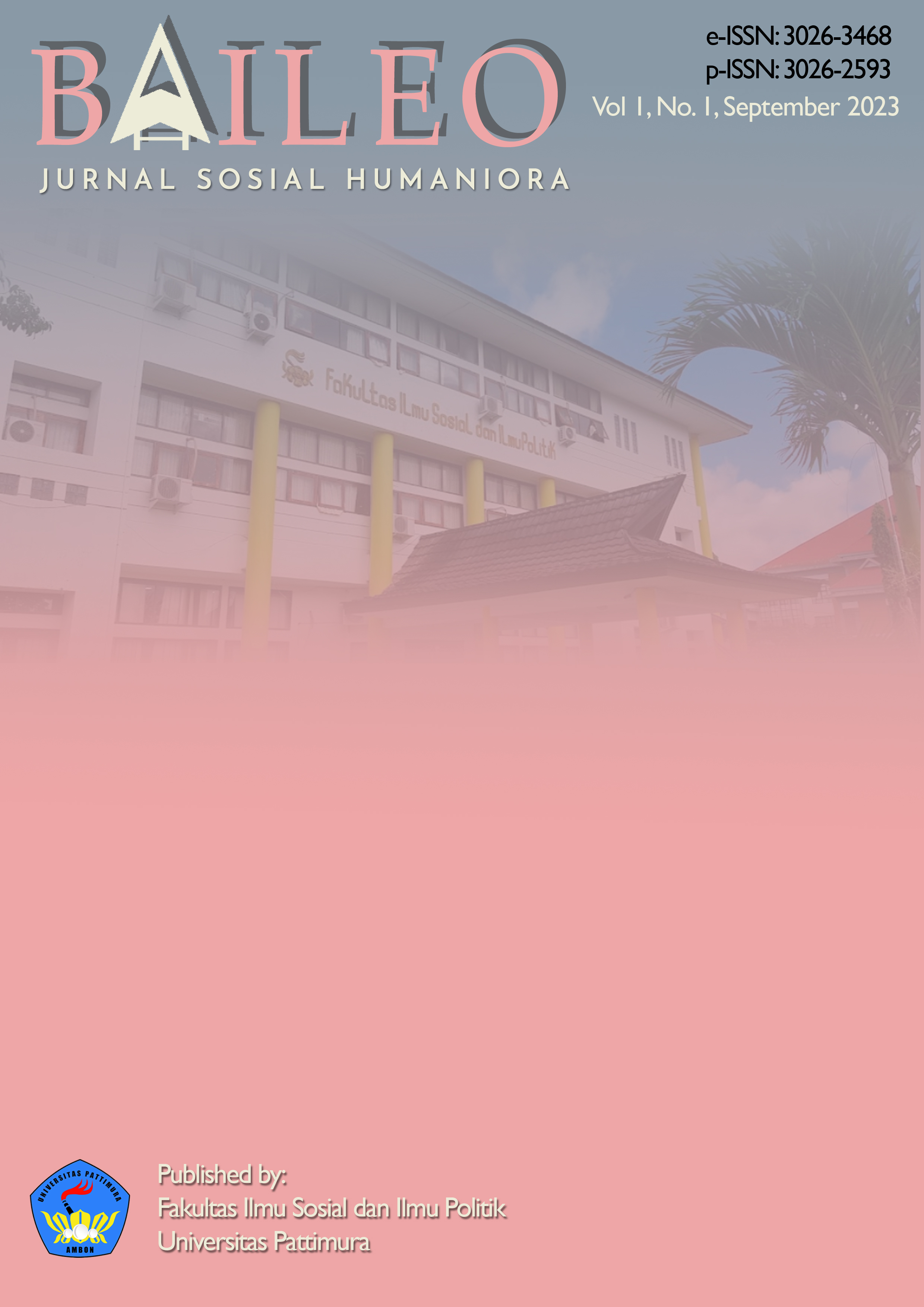The Sao Stone Cosmology within the Aman Seri Community in Urimessing
Abstract
This study explores the cosmological significance of the Sao Stone within the indigenous Aman Seri community in Urimessing, aiming to reveal the philosophical dimensions of their worldview and its role in sustaining cultural identity and cosmic continuity. Employing a qualitative approach, the research was conducted through fieldwork, including in-depth interviews, guided discussions, and participant observations. The study examines how the cosmological process surrounding the Sao Stone intertwines the development of human beings, the indigenous Aman Seri community, and other cosmic substances in a continuous, layered flow. The findings demonstrate that the Sao Stone is not merely a physical object but a symbol of existential cohesion that shapes and reflects the evolving identity of the Aman Seri cosmos. Its cosmology is marked by two core characteristics: first, the unceasing, accumulative nature of growth across human, communal, and cosmic levels, where each new incident contributes to an ever-renewing heritage; and second, the sequential realization of cosmic elements, indicating a process without abrupt leaps, grounded in the maturity and density of preceding developments. Each stage in the cosmological process holds autonomous significance, while simultaneously depending on the pressure and specificity of the moment it emerges from. The novelty of this research lies in articulating the dynamic and recursive nature of Aman Seri’s cosmology as a framework of cultural resilience and adaptive identity. It contributes to broader discourses in social sciences and the humanities by emphasizing the relevance of indigenous cosmological systems in understanding community-based environmental philosophies, historical endurance, and cultural regeneration. Further studies are encouraged to investigate other cosmological symbols across Maluku that may offer parallel insights into local knowledge systems and their ongoing transformation.
Downloads
References
Consina, K., Watloly, A., & Murwani, P. (2023). The Role of Government and the Community in the Development of Morea Pond Tourism in Larike Village, West Leihitu District, Central Maluku Regency. West Science Social and Humanities Studies, 1(06), 445–450. https://doi.org/10.58812/wsshs.v1i06.504
Creswell, J. W. (2017). Research Design: Qualitative, Quantitative, and Mixed Methods Approaches. Sage publications.
De Felice, A., Larrouturou, F., Mukohyama, S., & Oliosi, M. (2021). Minimal Theory of Bigravity: construction and cosmology. Journal of Cosmology and Astroparticle Physics, 2021(04), 15. https://doi.org/10.1088/1475-7516/2021/04/015
Ellen, R. (2023). Generational Difference, the Category Pemuda and the Several Paradoxes of Becoming Indonesian for Nuaulu in the Moluccan Islands. The Asia Pacific Journal of Anthropology, 1–21. https://doi.org/10.1080/14442213.2023.2215741
Geertz, C., & Cossu, A. (2021). Intellectual Autonomy, and Interpretive Social Science. American Journal of Cultural Sociology, 9, 347–375. https://doi.org/10.1057/s41290-019-00085-8
Gupta, A. Das. (2022). The maritime trade of Indonesia: 1500–1800. In South East Asia Colonial History V1 (pp. 91–125). Routledge. https://doi.org/10.4324/9781003101666-7
Koritelu, P. (2021). Building Maluku in the Character of the Island (A Critical Review). Review of International Geographical Education Online, 11(4).
Kultaieva, M. D., & Panchenko, L. M. (2022). Miracle as a Message: Cosmological, Anthropological and Educational Implications. Anthropological Measurements of Philosophical Research, 22, 26–35. https://doi.org/10.15802/ampr.v0i22.271323
Matakena, F., Watloly, A., Andi Agustang, A. A., Adam, A., & Alim, A. (2020). The Self-Concept of Ale Rasa Beta Rasa in the Orang Basudara Community in Ambon (Studies on the Community of Passo and Batumerah Country). International Journal of Criminology and Sociology, 9, 1306–1311. https://doi.org/10.6000/1929-4409.2020.09.150
Neumann, H.-P. (2022). Émilie Du Châtelet Within the Correspondence Between Christian Wolff and Ernst Christoph of Manteuffel. In Époque Émilienne: Philosophy and Science in the Age of Émilie Du Châtelet (1706-1749) (pp. 147–174). Springer. https://doi.org/10.1007/978-3-030-89921-9_7
Niemeijer, H. E. (2021). Conquest, colonialism, and religious conflict in the Moluccas in the early Seventeenth Century. In Early modern toleration (pp. 216–236). Routledge. https://doi.org/10.4324/9781003030522-15
Orford, P. (2020). The Unfinished Picture: The Mystery of Rosa Bud. Dickens After Dickens, 101–116. https://doi.org/10.2307/j.ctv12fw7r4.10
Planelles, S., Borgani, S., Quilis, V., Murante, G., Biffi, V., Rasia, E., Dolag, K., Granato, G. L., & Ragone-Figueroa, C. (2021). Exploring the role of cosmological shock waves in the Dianoga simulations of galaxy clusters. Monthly Notices of the Royal Astronomical Society, 507(4), 5703–5719. https://doi.org/10.1093/mnras/stab2436
Schwartz, W. A. (2022). A Universe of Subjects: Process Cosmology and Deep Ecology. Process Cosmology: New Integrations in Science and Philosophy, 147–170. https://doi.org/10.1007/978-3-030-81396-3_6
Šorli, A., Čelan, Š., Jafari, S., Fiscaletti, D., & Brzo, A. B. (2022). Eternal universe in dynamic equilibrium. Physics Essays, 35(1), 15–24. https://doi.org/10.4006/0836-1398-35.1.15
Theis, R. (2020). Christian Wolff über Philosophie als Wissenschaft der möglichen Dinge. In Perspektiven der Philosophie (pp. 117–135). Brill. https://doi.org/10.1163/9789004443570_008
Wijaya, D. N., Wahyudi, D. Y., Umaroh, S. Z., Susanti, N., & Ertrisia, R. A. P. (2021). The toponymy of the villages in Ambon Island: a historical and archaeological study. Berkala Arkeologi, 41(1), 89–108. https://doi.org/10.30883/jba.v41i1.600
Wolff, C. (2022). Briefe von Christian Wolff aus den Jahren 1719-1753. BoD–Books on Demand.
Žižek, S. (2020). Pandemic!: COVID-19 shakes the world (First). John Wiley & Sons. https://doi.org/10.2307/j.ctv16t6n4q
Žižek, S. (2021). Blade Runner 2049: A View of Post-Human Capitalism. Lacanian Perspectives on Blade Runner 2049, 41–51. https://doi.org/10.1007/978-3-030-56754-5_3
Copyright (c) 2024 Fransina Matakena, Aholiab Watloly

This work is licensed under a Creative Commons Attribution 4.0 International License.




